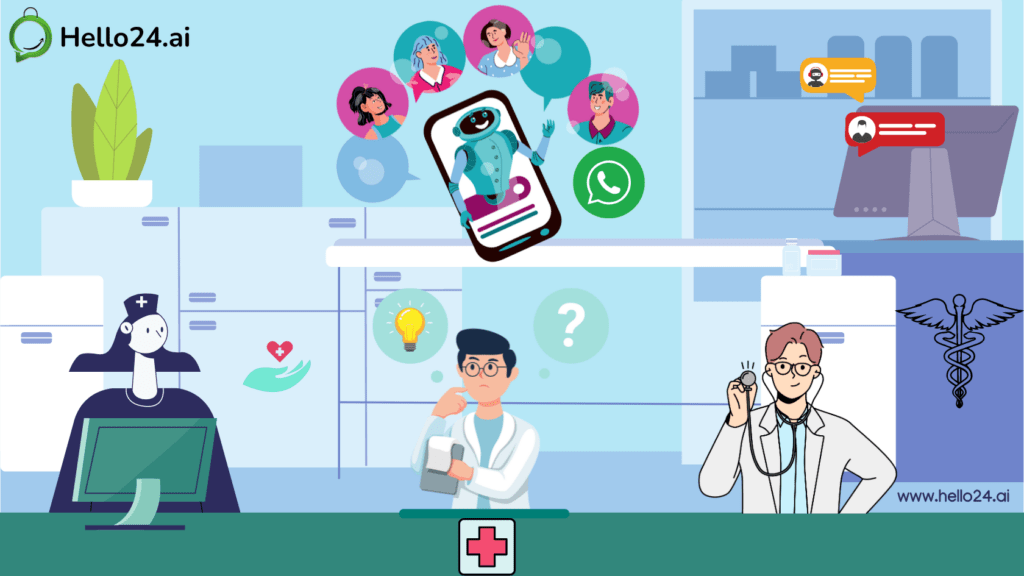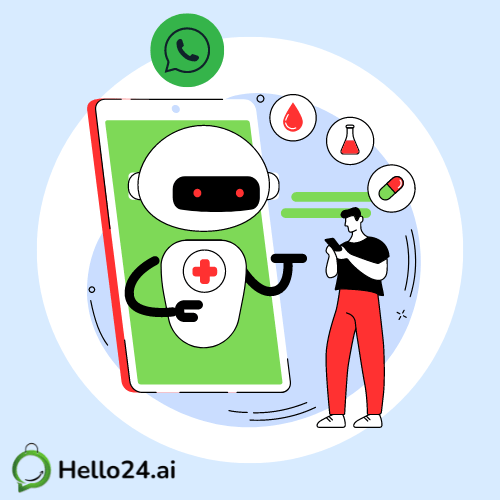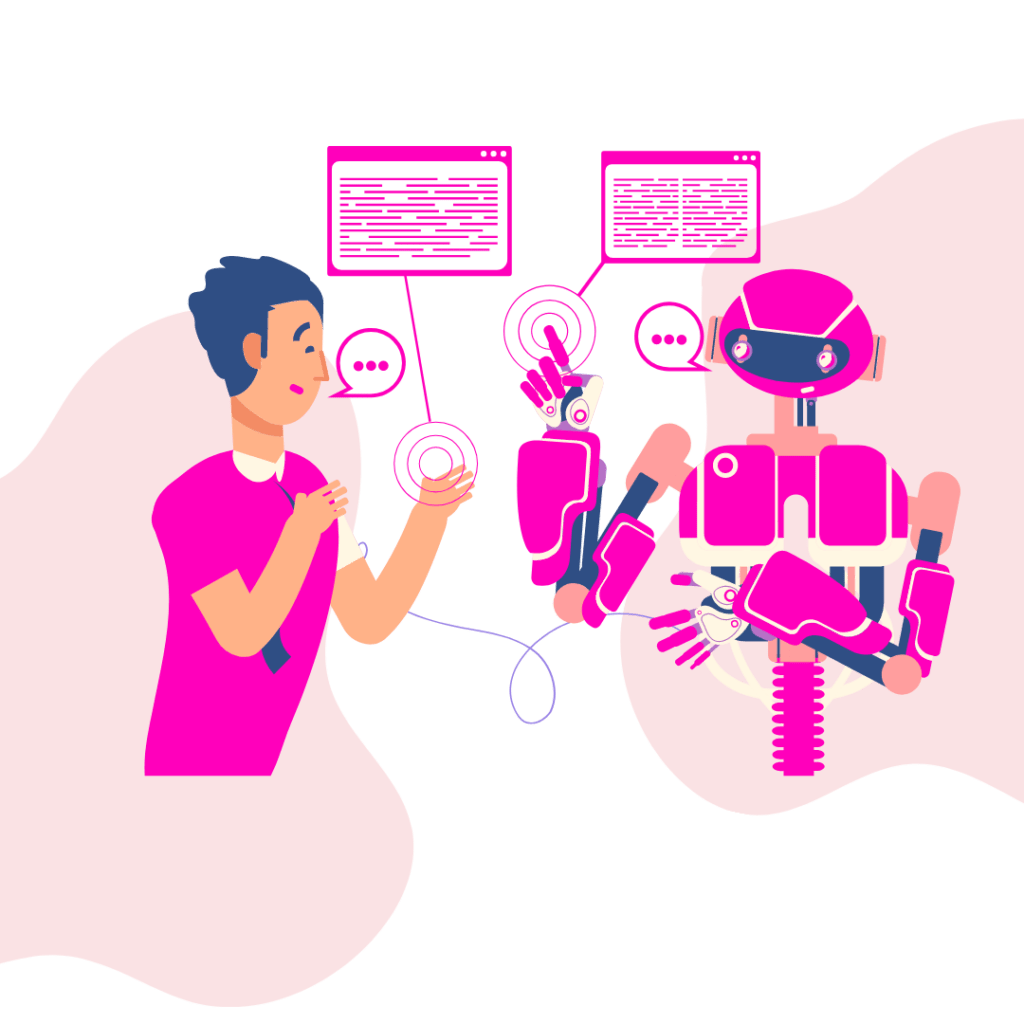⚕️🤖 Unlocking the Power of WhatsApp Chatbot for Hospitals!
In an era where technology is reshaping the healthcare landscape, WhatsApp chatbot has emerged as a game-changer for hospitals worldwide. 🌍 Seamlessly blending the convenience of WhatsApp with the intelligence of chatbot technology, this innovative solution is revolutionizing patient experiences and transforming hospital operations. 🏥
Are you curious about the remarkable benefits that WhatsApp chatbots bring to the healthcare realm?
🤔Look no further!
In this blog post, we’ll unveil the top 5⃣ benefits that make WhatsApp chatbots an invaluable asset for hospitals, ensuring smoother workflows, enhanced patient engagement, and optimize care delivery.
So, fasten your seatbelts and get ready to launch on a captivating journey that unveils the untapped potential of WhatsApp chatbot in the healthcare industry.
Let’s dive in! 🚀🔍
#1] Enhanced Patient Engagement and Support
WhatsApp chatbots offer hospitals a powerful tool to engage and support patients effectively. By integrating chatbots into their WhatsApp channels. Hospitals can provide instant responses to frequently asked questions, appointment scheduling, and general inquiries. Additionally patients can access information about doctors, clinics, and medical services at any time, creating a seamless and convenient experience. The chatbot can offer automated responses or intelligently escalate queries to human operators when necessary, ensuring timely and personalized support.
#2] Efficient Appointment Management with a WhatsApp Chatbot
Appointment management is a crucial aspect of hospital operations, and WhatsApp chatbots can significantly streamline this process. With a chatbot, patients can easily schedule, reschedule, or cancel appointments through the WhatsApp interface. By automating appointment reminders and notifications, hospitals can minimize no-shows and optimize their scheduling systems. Additionally Chatbots can also provide real-time updates on wait times, reducing patient anxiety and improving overall satisfaction.
#3] Instant Access to Medical Information
WhatsApp chatbots enable hospitals to provide patients with instant access to medical information. Patients can inquire about symptoms, medications, and general health queries through the chatbot, receiving accurate and reliable responses. By leveraging AI and machine learning, chatbots can offer personalized health recommendations, educate patients about specific medical conditions, and promote wellness practices. Basically this availability of information empowers patients to make informed decisions about their health and promotes self-care.
#4] Patient Support and Triage Assistance 24/7 x 365 Days
Medical emergencies can happen at any time, and WhatsApp chatbots can play a crucial role in providing 24/7 support and triage assistance. Chatbots can interact with patients and catch initial questions. Provide initial recommendations, and redirect patients to appropriate medical services based on the severity of their condition. Which later will be examined by a medical practitionar. By offering triage assistance, chatbots can help hospitals manage patient volumes effectively. And prioritize urgent cases, ensuring timely care for those in critical need.
#5] Data Collection and Analysis for Improving Hospital Management
WhatsApp chatbots can serve as valuable tools for data collection and analysis in hospitals. Through conversational interactions, chatbots can collect patient feedback, satisfaction ratings, and demographic information. This data can be analyzed to identify areas for improvement, measure patient experiences, and enhance service delivery. Chatbots can also integrate with electronic health records (EHR) systems. And enable seamless data transfer and reducing manual data entry tasks for healthcare providers.
Here are examples of three healthcare or hospital brands that were known to use WhatsApp chatbot services:-
✅1mg: An Indian online healthcare platform, introduced a WhatsApp chatbot to offer medication-related services. Users could order medicines, get information about drug interactions and side effects, and receive reminders for medication refills. Emphatically the chatbot aimed to provide convenient access to medicines and assist users in managing their healthcare needs.
✅NHS (National Health Service) Chatbot: The National Health Service in the United Kingdom implemented a WhatsApp chatbot to provide COVID-19-related information and support during the pandemic. The chatbot offered guidance on symptoms, testing locations, self-isolation guidelines, and vaccination information. It helped alleviate the strain on healthcare services by providing timely information to the public.
✅Apollo Hospitals: A renowned healthcare provider in India, integrated a WhatsApp chatbot to enhance patient engagement and support. The chatbot offered services such as appointment scheduling, health tips, and information about medical procedures. It aimed to provide personalized assistance and streamline communication between patients and the hospital.
Let’s Conclude!
Revolutionizing Healthcare: Unlocking the Power of WhatsApp Chatbots! 📱💙
As we reach the end of this journey exploring the top 5 benefits of WhatsApp chatbots for hospitals, it’s clear that these digital marvels have the potential to transform healthcare delivery and patient experiences. 💡
From enhancing patient engagement and support to streamlining administrative tasks, WhatsApp chatbots empower hospitals to provide seamless and personalized care in a rapidly evolving digital landscape. 🌈
Imagine patients being able to effortlessly schedule appointments, access medical information, and receive timely support, all at the tips of their fingers. With WhatsApp chatbots, this becomes a reality.🙌
Furthermore, the cost savings, language accessibility, proactive health monitoring, and data-driven insights brought about by these chatbots create a robust foundation for efficient and patient-centric healthcare systems. 📊
The healthcare industry stands at the precipice of a technological revolution, and WhatsApp chatbots are paving the way towards a future where healthcare is accessible, efficient, and empowering. 🌟
So, let us embrace this digital transformation with open arms and strive to integrate the power of WhatsApp chatbots into hospitals worldwide. Together, we can build a healthcare ecosystem that puts patients at the center and leverages technology to its fullest potential. ⚕️
Remember, the future of healthcare is now, and WhatsApp chatbots are our trusted companions on this transformative journey. Let’s embark on this path of innovation and redefine the boundaries of what’s possible in healthcare. 🌟
Thank you for joining us on this exploration of the incredible benefits that WhatsApp chatbots bring to hospitals. Together, we can revolutionize healthcare, one chatbot interaction at a time!
Want to know🔍 how other healthcare/hospital brands🌍 worldwide are breaking barriers & Transforming Patient 🏥Engagement with WhatsApp Chatbot🤖💙?
WhatsApp chatbots are used in healthcare to enhance patient communication and engagement by providing personalized support, appointment scheduling, medical information access, and proactive health monitoring, resulting in improved healthcare outcomes and streamlined operations.
WhatsApp chatbots are used in hospital management to automate and streamline processes such as appointment scheduling, patient inquiries, staff coordination, and data collection, leading to improved efficiency, better resource utilization, and enhanced patient experience.




